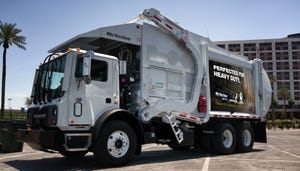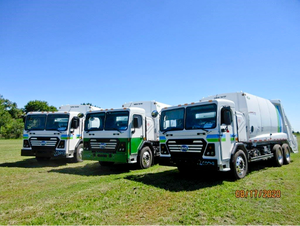Small Haulers Struggle To Survive Carbone
April 1, 1995
Cheryl L. Dunson
Jay Brown and his partner never realized the gamble they were taking when they opened the doors of J&S Dumpster Service. Since its inception six months ago, the Winston-Salem, N.C.-based company has yet to haul any waste to the county landfill.
If area waste haulers begin to transfer city waste to facilities in neighboring counties, the local government will lose more than $1.4 million in annual tipping fees at its site. As a result and as a means of self-preservation, Winston-Salem will award franchise agreements beginning this July. The information gathered from the franchise applications, such as the percentage of wastes expected to be brought to the local landfill, reportedly will help city officials prepare for the future.
Brown's business can't grow without a guaranteed territory. While the city deliberates to whom it will issue franchises, Brown has put his new business on hold for fear of investing heavily in equipment that may never be used. "If we were all on the same level, there'd be no comparison in my rates and [the large privates']," said Brown, a 14-year veteran of a large waste conglomerate. "I would not have to worry about them hauling [local] waste to their out-of-county landfills at a cheaper price. I'd tear 'em up."
Out of the four local companies applying for a franchise, J & S is the "only small one in the bunch," said Dan Miles, the solid waste administrator for the Winston-Salem/For-syth County Utility Commission.
A Nation In Transition From California to Delaware, some haulers are realizing that they might be muscled from the marketplace if they don't own landfills. Further, lo-cal governments can no longer control waste streams.
Yet, many are discovering that flow control - or the lack of it - may mean the difference between laying off employees and keeping trucks on the road.
In Springfield, Mo., the city's lar-gest independent, Sparky's Waste Control, has 13 employees to service 7,000 customers. Owner Gary Dea-ver, a college chemistry major who formed Sparky's 25 years ago, said that he can't compete for large-volume accounts because of the difference in tipping fees at the city's landfill and the private haulers' neighboring facilities.
The city government supports its waste reduction and recycling programs through tipping fees at its landfill. "The lack of flow control is impacting my company's ability to compete with the vertically integrated companies," Deaver said. "It's impossible for me to land any large-volume accounts. [The large privates offer] lower tipping fees which make their costs lower than mine. It actually makes me look bad when I bid."
To compensate, Deaver, who is a member of several local industrial development and environmental boards, said his company relies on civic commitment and strong community ties. "We've stressed value-added service and community re-sponsibility. Growth isn't phenom- enal, it's one account at a time."
In light of the Supreme Court's Carbone ruling, which declared flow control unconstitutional, other mu-nicipalities, such as Sunnyvale, Calif., also have resorted to franchise agreements to manage their solid wastes. Bay Counties Waste Services Inc., for example, is a licensed franchised hauler for Sunnyvale's commercial and residential waste. The city also contracts with private companies for transfer station and landfill services.
California's stringent waste reduction laws have turned solid waste in-to a technologically sophisticated business, said Bay Counties' C.F.O., Bill Dobert. "What happens to the government contracts and bonds when there's no waste coming to their facilities? [That's why] franchising is unique to this area. An estimated 90 percent of the cities from Northern California to Oregon have franchises. There's security in having a franchise. There's no way to ra-tionally organize a solid waste system without [flow control]," said the former corporate banker.
Flow Control Fans The Delaware Solid Waste Au-thority requires all haulers to have a collector's license which stipulates that all waste must be disposed at one of the authority's three landfills or its transfer station. Besides disposing of all Delaware-generated waste in-state, haulers also agree not to import out-of-state waste.
"We've had flow control since I can remember," said Alan Tolliver, general manager of Robert Tolliver Inc., Newark, Del. "We like it because it puts everyone on equal footing." Tol-liver's 35-year-old, family-owned-and-operated business is one of 10 hauling companies which serve ap-proximately one-third of the state.
Flow control regulations were the result of the Authority's attempts to secure financing in the bonds market during the late '70s, according to Authority officials who also say that, despite problems such as the Car-bone ruling, an unsuccessful lawsuit and a few minor infractions, their program works.
Although Tolliver admits the au-thority's tipping fees may not be the cheapest, he says that everyone benefits from the programs funded by the fees.
"Flow control helps the authority to make plans," Tolliver said. "I've never really thought of it as anti-competitive, I just see how it helps our area. [With flow control], none of the haulers have to worry about a competing transfer station or a cheaper out-of-state landfill. Every-body pays the same rate."
Harold Hill, the owner of Heart-land Enterprises in Davenport, Iowa, says flow control directly impacts his ability to compete with the large privates. Heartland collects waste in Scott County, Iowa, where flow control is implemented through an in-tergovernmental agreement between the county and 14 local municipalities. Hill also collects waste in Il-linois, where he disposes of waste at one of three private landfills.
By signing Scott County's "28-E A-greement," municipalities delegate their respective powers to the Scott Area Solid Waste Management Com-mission (SASWMC) to manage all as-pects of the county's MSW program, including final disposal.
All SASWMC services are funded by the landfill's tipping fees. "The lack of flow control hurts me real bad when I'm competing for communities that aren't a part of the 28-E Agreement," said Hill, who must compete with eight other haulers for municipal contracts. "It's much better when it's in the contract to use the same [landfill]."
SASWMC is aware of the hauler's plight. "[It's a challenge for] our small haulers to stay in business," said SASWMC's executive director. "We have several major haulers in our area and, because of the flow control issues, we've been very cautious not to burden our landfill fees," she said.
Forty-five minutes south of Louis-ville, Ky., Tony Blessitt says he considers himself to be competitive if he ends the day without losing a customer. The 35-year-old general manager of Kosmosdale Sanitation represents the only family-owned hauling business left in Radcliff. All the others reportedly have been acquired by large conglomerates or are out of business.
Hardin County, along with Bles-sitt, will continue to use out-of-county, privately-owned landfills until the county's new facility is constructed later this year. The county's exclusive franchise agreement specifies that all residential waste collected in unincorporated portions of the county must be disposed at the $8 million landfill when it opens. A nearby landfill owner is contesting the agreement in court.
Blessitt says he'll support the county's new landfill, but admits flow control would make the market more equitable for all haulers.
The flow control issue has to do with attitudes, according to John Paul Jones III, executive director of the Washington Refuse and Recy-cling Association (WRRA).
"Out here, families have been in business since the turn of the century. They're fiercely proud and have a strong entrepreneurial spirit," he said. "But [solid waste management] is a process and the best way to do it is by working together."
Jones said WRRA's membership, a mix of solid waste handlers, "generally supports flow control as a way to pay for facilities. They've been in-structed to work with local government. We've never had a member challenge a flow control ordinance. Nor do I expect one to," he said. "In Washington, local government de-signs the plans and they're carried out by public and private interests in a cooperative fashion. That's the significant difference: attitudes."
Across the country, in Winston-Salem, Brown stays afloat by servicing commercial office paper recycling accounts as he anxiously awaits word on his franchise license, which will determine the fate of his young company's future.
"Without a license, Brown or anyone else won't be able to collect commercial waste in Winston-Salem," explained Dan Miles of the Winston-Salem/Forsyth County Utility Com-mission. "Ideally, flow control would have solved this problem."
You May Also Like


